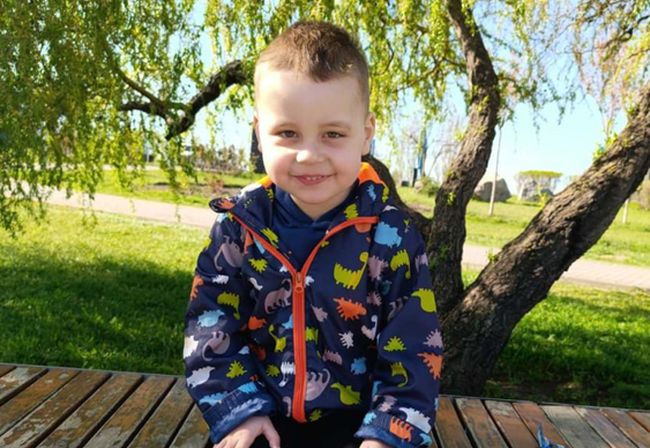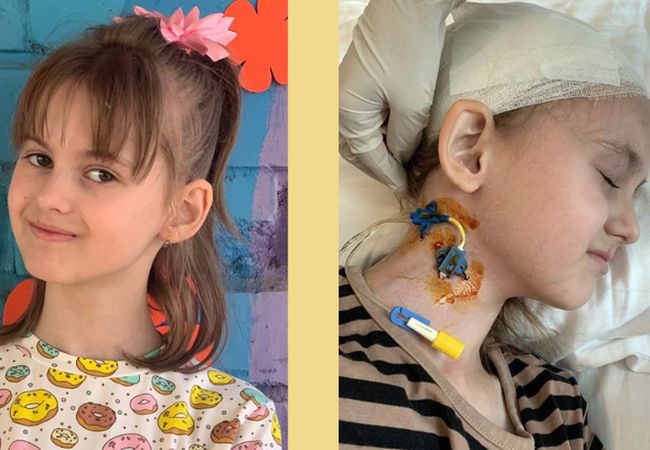
Milena, 11, in the intensive care unit of the children's hospital in Zaporizhzhia.
Diana is brought into intensive care at 10:09 a.m. Three nurses, a doctor and an attendant grab the green sheet the girl is lying on and heave her from the stretcher onto a bed.
The girl has smooth facial features, and her dark brown hair is protruding above the bandage wrapped around her head. Her skin is pale and her eyes stare straight ahead. Diana is 16 years old, but she looks far younger on this Saturday morning at the children’s hospital. Like a vulnerable little girl.
An anesthesiologist walks up to Diana’s bed holding the initial diagnosis in her hands: Open craniocerebral trauma, partially fractured skull, partial brain tissue displacement, foreign object embedded in the head, likely a piece of metal shrapnel. She has also suffered wounds to her thigh and right foot, "up to seven centimeters long." Her heartbeat is described as clear and rhythmic, and she is conscious. Because of her serious head wounds, it has been recommended that she receive treatment in the neurology department.
Diana is from Mariupol, the port city on the Sea of Asov. In times of peace, the drive from her hometown to the children’s hospital in Zaporizhzhia takes just three hours. But Mariupol has been the focus of Russian artillery fire and air strikes for several days, with no other city in Ukraine being as heavily bombarded. Four-fifths of the buildings in the city are thought to have been destroyed, with the Russian military dropping bombs on residential buildings and engaging in house-to-house combat with the Ukrainian resistance.
Diana has escaped this catastrophe, but certainly not unscathed. She is lying in Room 2 in the intensive care unit. Precisely how she was wounded isn’t entirely clear, but her parents told the paramedics that she had shrapnel wounds to her head and limbs. If the 16-year-old were able to turn her head, she would see the rapid, precise hand movements of the doctors and nurses. But she would also see that the intensive care unit has been turned into a bunker, with several layers of sandbags having been stacked at the window to protect against attack. Hardly any daylight makes its way into the room.
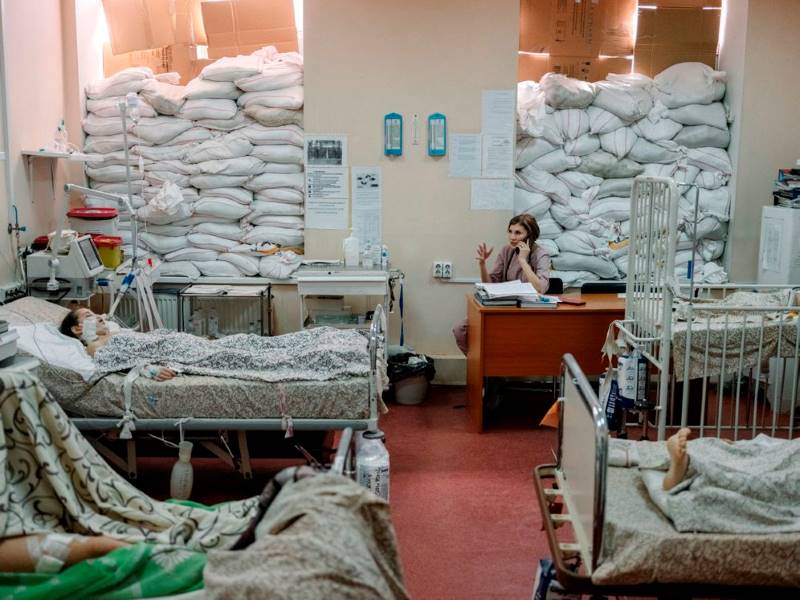
The children's intensive care unit in Zaporizhzhia, windows carefully blockaded with sandbags.
The children’s hospital is in the center of Zaporizhzhia, a large city on the banks of the Dnieper River that his home to three-quarters of a million residents. The path to the clinic’s intensive care facility leads through a courtyard, past ambulances and a mural on the wall of a joyful child. Room 2 is on the ground floor, a space of 20 square meters (215 square feet) with four beds, each of them occupied by a young victim of this war. They are named Diana, Masha, Milena and Artem.
Diana emits a muffled cry when one of the nurses inserts a needle into her right arm. A nurse whispers something to her and she nods. Then, the 16-year-old vanishes into the fog of pain medication. She has hardly any awareness of the children in the other three beds.
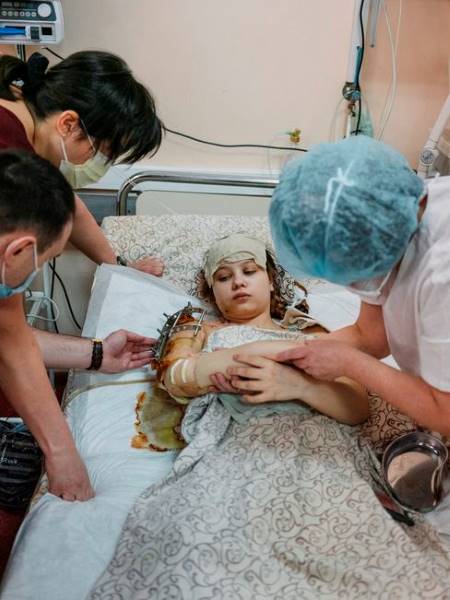
Intensive care patient Masha: "Traumatic amputation of the right leg."
Across from her is Masha, a 15-year-old from Polohy, a town located about halfway between Zaporizhzhia and Mariupol. Her left leg is propped up on a pillow, while a sheet hides the stump on the other side. "Traumatic amputation of the right leg" above the knee, one of the doctors explains. "Compound fracture of the right arm, injuries from shell shrapnel." Masha was walking through her hometown with her mother and a friend when a projectile detonated three meters away.
At the bed beneath the lefthand window, a surgeon changes the bandage on a girl’s left cheek. The 11-year-old is anesthetized, and tubes have been inserted into her mouth. "Milena from Mariupol," the doctor says. "Gunshot wounds to the jaw, injuries to the teeth and gums." Using tweezers, the surgeon removes cotton from the bullet’s exit wound just under the left ear.
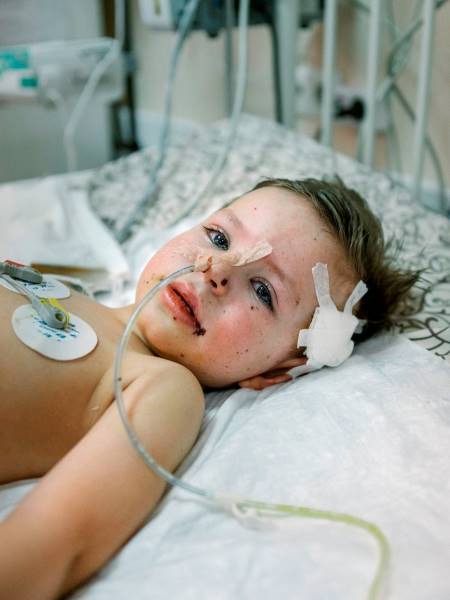
Artem and his family were fleeing from Mariupol when their car was struck by bomb shrapnel."
The doctor focuses intently on his task, despite the screams coming from the fourth bed in the room, where little Artem is lying. A surgeon is busy removing shrapnel from the right side of his body. Artem’s family was fleeing from Mariupol when their car was struck by bomb shrapnel in a town just outside the city. Artem has injuries to his stomach, head, arms and legs. Further operations will follow. He is two years and 10 months old.
Of course it is psychologically stressful to operate on children, says Vladyslav Derhalyuk, especially children with these kinds of injuries. Derhalyuk is 30 years old and a surgeon at the military hospital in Zaporizhzhia, around 10 minutes away from the children’s hospital. For the past week, he has been providing support to the doctors at the children’s hospital – ever since Masha was admitted, the girl with the amputated leg. He says he helps out during operations on patients with serious injuries. "The doctors here don’t have much experience with such wounds," he says, "but we do." The war is eliminating the difference between civilian and military hospitals. The patients with gunshot wounds and shrapnel injuries are no longer just soldiers, but also children.
How is he able to deal with it all? With the young patients and the brutality of the attacks? Derhalyuk hesitates. There isn’t much time for reflection in the clinic. And before he can find an answer, the door opens. His colleague Olena Ponomarenko is calling for him – his assistance is needed in another operating room.

An injured person being brought in to the military hospital in Zaporizhzhia.
In Zaporizhzhia in southeastern Ukraine, the character of this war, which was launched by a large-scale Russian invasion, is on full display. The city has become a forecourt of the hell of Mariupol, where Russian troops are mercilessly attacking the city’s civilian population at the behest of Vladimir Putin. A city where a maternity hospital and protective shelters for children have been bombed into rubble. A city where mass graves have had to be dug.
For many who have managed to make it out of Mariupol, Zaporizhzhia is the first safe destination. A number of cars are parked in front of the train station with license plates bearing "AH," which stands for the region where Mariupol is located. Some of the arrivals have attached white rags to their mirror in the – often futile – hopes of not being targeted. Many car windows bear signs with four Cyrillic letters on them: "дети," meaning "children" in Russian.
At the same time, Zaporizhzhia is a good place from which to peer into the future. Developments can be seen here which may be decisive for the development of the conflict. After four weeks of fighting, the war is heading into a phase that military experts refer to as "culmination." It refers to a situation in which troops become bogged down because they have achieved none of their aims and must change focus.
A New, Messier Phase
Two military scenarios seem most likely at the moment, and Zaporizhzhia plays a central role in both of them. In the first scenario, the large-scale Russian offensive continues as it has, despite all of the setbacks. Putin’s troops aren’t likely to be able to take control of Kyiv and the Black Sea metropolis of Odessa – and the Russian Defense Ministry’s recent suggestion that it will begin focusing more on eastern Ukraine may indicate that such war aims have, in fact, been abandoned. Still, the Russians may be able to encircle Ukrainian troops fighting in the country’s East. Those troops represent a significant portion of the regular Ukrainian army, made up of around 10,000 soldiers and some of the country’s elite units. If the Russian military successfully cuts them off from the rest of the country, the consequences for Ukraine would be disastrous. In the attempt to do so, Putin’s troops could march on the city of Kryvyi Rih, isolate Zaporizhzhia and cut off possible routes of retreat for the Ukrainians.
The Ukrainian military, of course, is well aware of the strategic value of Zaporizhzhia. Cars approaching from the west are carefully inspected while armed police, soldiers and members of the civilian militia are constantly patrolling. Crossing the bridges over the Dnieper means negotiating a maze of sandbags and concrete blocks.
The second, no-less-dangerous scenario would be a stalemate. After the high losses thus far sustained by the Russians along with numerous tactical errors, morale among the invaders may have been decisively reduced. The Ukrainian forces managed to ward off the initial thrusts of the Russians, notes an analysis from the Institute for the Study of War, a think tank in Washington, D.C.
The authors of the analysis believe the war is on the verge of entering an even bloodier phase. Should a stalemate emerge, they believe, the Russians could continue bombing Ukrainian cities, destroying them and killing civilians. The goal would be that of wearing Ukraine down and breaking its will to fight.
"Less than a 10 Percent Chance of Survival"
The regional administration building in Zaporizhzhia is a hulking Soviet-style concrete edifice, and a man has recently moved into an office there who has become a symbol of the toughness of the Ukrainians. A man who didn’t even give up after the Russians took control of his region.
"I gave myself less than a 10 percent chance of survival," says Ivan Fedorov. "I knew they put no value on human lives." He is 33, about six feet tall and athletic. He speaks in a quiet tone and it is clear that he hasn’t slept much lately.
Fedorov, the mayor of the southern Ukrainian city of Melitopol, was abducted by Russian troops on March 11, as shown in a video of him being pulled out of a cultural center by seven men in uniform, a plastic bag pulled over his head.
The occupiers held him for six days in a detention center in his city. Prior to his abduction, Federov had refused to follow the orders issued by the occupiers who had taken control of Melitopol on Feb. 25, the second day of the war. Earlier this month, he was released in a prisoner exchange for nine Russian soldiers.
He is unable to return to his occupied hometown, which is why he and his team have continued their work in Zaporizhzhia, a two-hour drive north of Melitopol. Federov organizes aid deliveries for his city and maintains contact with those who are still there.
He describes his time behind bars as frightening. He says he was interrogated at night for several hours at a time by Russian intelligence agents and that he heard screams from neighboring rooms. "The cells were full of people they had picked up off the street," says Fedorov, adding that they were accused of being "agents of Ukraine. They tortured and beat them."
There are those in the West who have encouraged Ukraine to make peace with the invaders to prevent even more loss of life. But Fedorov’s story makes it clear just how absurd such ideas are. Many people, he says, no longer venture out onto the streets because they are afraid of disappearing without a trace. The Russians in Melitopol are acting "like bandits," he says. "They ransack the offices of businesspeople, taking their documents and money."
The war has now been underway for four weeks, and Ukrainian leaders have been appealing for just as long to the conscience and morals of countries overseas. Much of the effort is being born by the masterful speaker Volodymyr Zelenskyy, the president of Ukraine – his videos full of anger and desperation, his appeals to the parliaments of countries in the West. On top of the fury displayed by Zelenskyy, many citizens, fighters and politicians in the country have also been gripped by another emotion: An almost childlike amazement at Moscow’s arrogance.
Down Into the Catacombs
Ivan Fedorov puts it as follows: "I simply don’t understand why I, as a citizen of Ukraine, should give up part of Ukrainian territory to the Russian Federation." He says he doesn’t get why the Kremlin should be allowed to determine the future course of his country.
The Ukrainians refuse to back down and the Russians possess destructive weapons and have no scruples about deploying them against residential buildings and hospitals. Where is this war heading?
Fedorov says he is well aware that many conflicts end in negotiations. But his country, he says, must engage in those negotiations from a position of strength and with the backing of the European Union. Diplomacy for the sake of diplomacy doesn’t work, he says, as history has shown.
A security guard opens the door as sirens begin to wail. Fedorov must head down to the administrative building’s air raid shelter, where the regional parliament is also located. He walks down the stairs past the barbed wire checkpoints on the ground floor and down into the catacombs.
Fedorov is worried about the weeks ahead, concerned that a second, messier stage of the war might be approaching, one with even more severe Russian bombardments. If, that is, a diplomatic solution isn’t found soon.
It is a worry shared by Western military leaders, who fear that the Russian army may soon run out of precision rockets. Putin’s troops would then be forced to rely more heavily on less precise projectiles, which could drive up the number of casualties. That could mean, says Fedorov, that Zaporizhzhia may end up looking just as Mariupol does today.
The consequences would be devastating. More injured children, more deaths, more people fleeing the violence, potentially tens of thousands, or even hundreds of thousands, from Zaporizhzhia alone. It would also be a disaster for the doctors in the hospitals – for people like Vladyslav Derhalyuk and his colleague Olena Ponomarenko, both of whom are working to exhaustion every single day.
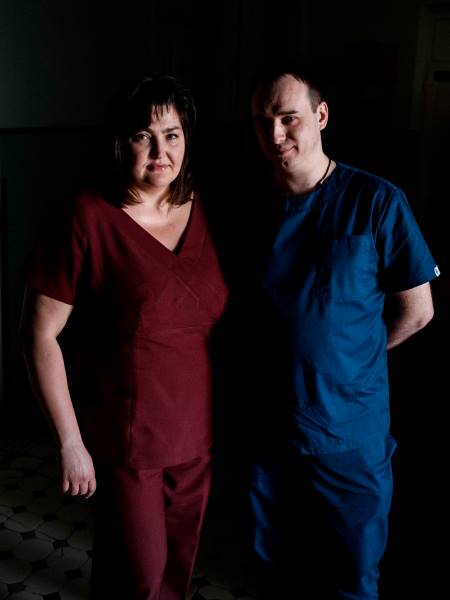
Olena Ponomarenko and Vladyslav Derhalyuk are doctors who work at the children's hospital in Zaporizhzhia.
Derhalyuk and Ponomarenko have just finished their shift at the children’s hospital. They head back to the military hospital where they have been spending their nights since the beginning of the war. The route leads along dusty roads to a vast complex of buildings. The hospital lies behind three-meter-high walls, which have been painted in the Ukrainian colors of blue and yellow and are topped with rolls of barbed wire. Dozens of anti-tank barriers called "Czech hedgehogs" have been welded together at the entrance, and they are flanked by piles of truck tires. A soldier checks our passports and papers, and then a woman in uniform leads us to the office of the commandant, as employees call the head of the hospital.
Responsibility in Times of War
Viktor Pysanko is not at his desk, rather he is sitting slightly slumped in one of the other chairs, holding his smartphone with two hands. A map of Zaporizhzhia and the surrounding region hangs on the wall next to the door. Pysanko is 35 and has the serious facial expression of someone carrying responsibility in times of war.
What he is currently experiencing in his own country, he says, is something he didn’t even see in war-torn Congo, where he worked for the United Nations in 2019. With a brief chuckle, he lifts the wooden turtle from his desk that he brought back from a Congolese village as a souvenir. Before that, he was stationed in Kosovo as part of the NATO-led mission there.
Two months ago, Pysanko was ordered to return to Ukraine to assume leadership of the military hospital in his home region. And for the last month, he and his personnel have been working around the clock. In Zaporizhzhia, he says, military doctors and their civilian counterparts have all been thrown together. "The Russian troops are using weapons that don’t differentiate between soldiers and civilians," says Pysanko.
Nine out of 10 injuries treated in the hospital are from four nearby battlegrounds: Orikhiv, Polohy, Tokmak and Vasylivka. They are both soldiers and civilians, and their injuries, says Pysanko, cover the entire spectrum. Blast injuries, gunshot wounds, shrapnel. He pulls out his phone and shows images from the operating room, including bodies pulverized by shrapnel, extreme burns and gangrene resulting from belated treatment. The rockets are the worst, the hospital director says. Just recently, Russian soldiers used them to fire on a village just outside of Zaporizhzhia.
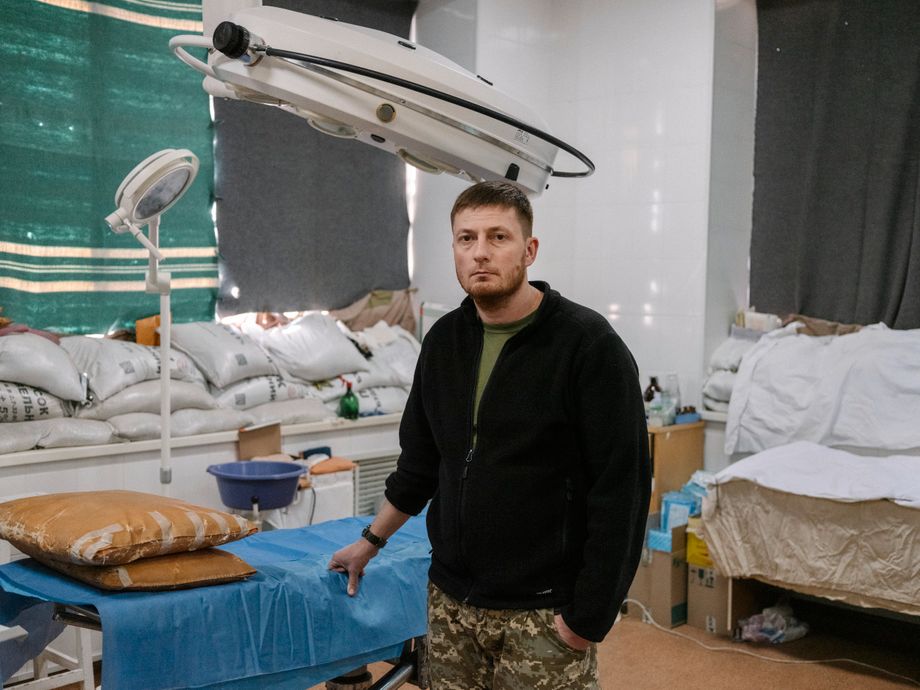
Viktor Pysanko is head of the military hospital in Zaporizhzhia.
Pysanko leads the way through the halls of the hospital past stretchers and operating tables with carefully arrayed sets of scalpels and tweezers. He lays his hand on a tomograph, which makes it easier to examine shrapnel wounds. "A gift from Poland," he says, adding that he’ll take whatever aid he can get.
"They'll Bomb Everything"
In one tract, wounded soldiers are sitting on their beds. One of them is still groggy and wants to be left alone, but others are willing to talk as long as their last names aren’t used. They are part of a unit that operates in secrecy.
Yuri, 25, and Michail, 26, joined the military as teenagers when the war in eastern Ukraine began in 2014. Yuri’s left leg is in a cast, with his crutches leaned up against the bed. In the room next door, Michail has his arm in a sling. Both of them are scheduled for release in about a week. They are not particularly forthcoming when asked about where they were fighting when they sustained their injuries, but they are clear on one point: They want to get back to the front as quickly as possible.
In all likelihood, the war will continue for some time to come. It doesn’t currently look as though a diplomatic breakthrough is imminent. The progress made in talks is far behind what the "dynamics of the developments" demand of Ukraine, Kremlin spokesman Dmitry Peskov said recently. The word "developments" presumably refers to the attacks on Ukrainian cities.
Victor Pysanko doesn’t believe the fighting will end anytime soon. When asked what kind of war might await his country, he responds tersely: Chechnya, Syria, artillery. "They will bomb everything, and only then will they move into the cities." Pysanko’s list of demands echoes that of many of his compatriots: a no-fly zone and better weapons, especially for the country’s air defenses.
Until recently, Pysanko says, he still had a personal contact in Mariupol, to the head of the military hospital there. Both of them got their start in 2014 as medics in Donbas. Pysanko was with the 25th paratroopers brigade, while his colleague was with the 95th. But he hasn’t heard anything from his colleague for the last few days, with communications lines to Mariupol having been severed.
"If Mariupol falls and we don’t get any help, the Russians will also attack my city," says Pysanko. He fears that his hospital could also then become a target.

